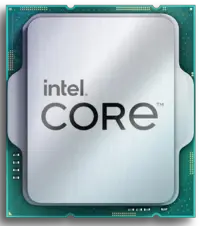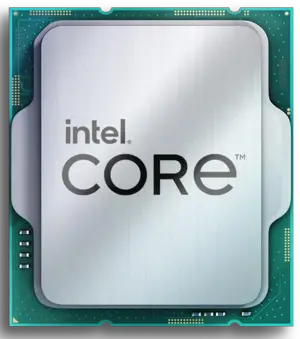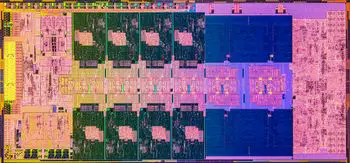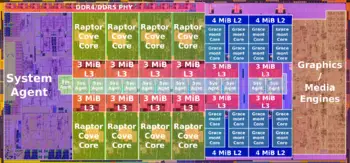| (11 intermediate revisions by the same user not shown) | |||
| Line 50: | Line 50: | ||
|predecessor link=intel/core_i9/i9-12900k | |predecessor link=intel/core_i9/i9-12900k | ||
}} | }} | ||
| − | '''Core i9-13900K''' is a {{arch|64}} [[tetracosa-core]] high-end performance [[x86]] desktop microprocessor introduced by [[Intel]] in late [[2022]]. This processor, which is based on the {{intel|Raptor Lake|l=arch}} microarchitecture, is manufactured on Intel's enhanced [[Intel 7]] process. The i9-13900K is a [[heterogeneous multicore]] SoC integrating eight [[big core|big]] {{intel|Raptor Cove|l=arch}} cores along with sixteen [[small core|small]] {{intel|Gracemont|l=arch}} cores. The [[big cores]] operate at 3.0 GHz with a {{intel|Turbo Boost}} frequency of up to 5.4 GHz, a {{intel|Turbo Boost Max Technology|Turbo Boost Max}} frequency of up to 5.7 GHz, and a {{intel|Thermal Velocity Boost}} frequency of up to 5.8 GHz. The [[small cores]] operate at 2.2 GHz with a {{intel|Turbo Boost}} frequency of up to 4.3 GHz. This processor has a base power of 125 W and a maximum turbo power of 253 W. This chip supports up to 128 GiB of dual-channel DDR5-5600 memory and incorporates Intel's {{intel|UHD Graphics 770}} IGP operating at 300 MHz with a burst frequency of 1.65 GHz. | + | '''Core i9-13900K''' is a {{arch|64}} [[tetracosa-core]] high-end performance [[x86]] desktop microprocessor introduced by [[Intel]] in late [[2022]]. This processor, which is based on the {{intel|Raptor Lake|l=arch}} microarchitecture, is manufactured on Intel's enhanced [[Intel 7]] process. The i9-13900K is a [[heterogeneous multicore]] SoC integrating eight [[big core|big]] {{intel|Raptor Cove|l=arch}} cores along with sixteen [[small core|small]] {{intel|Gracemont|l=arch}} cores. The [[big cores]] operate at 3.0 GHz with a {{intel|Turbo Boost}} frequency of up to 5.4 GHz, a {{intel|Turbo Boost Max Technology|Turbo Boost Max}} frequency of up to 5.7 GHz, and a {{intel|Thermal Velocity Boost}} frequency of up to 5.8 GHz. The [[small cores]] operate at 2.2 GHz with a {{intel|Turbo Boost}} frequency of up to 4.3 GHz. This processor has a base power of 125 W and a maximum turbo power of 253 W. This chip supports up to 128 GiB of dual-channel DDR5-5600 ECC memory and incorporates Intel's {{intel|UHD Graphics 770}} IGP operating at 300 MHz with a burst frequency of 1.65 GHz. |
| − | At the time of its introduction, at 5.8 GHz peak frequency, the Core i9-13900K (along with its non-GPU variant, the Core i9-13900KF), became the world's [[highest-frequency]] commercial processor ever released, surpassing the prior record set by the [[Ryzen 9 7950X]] just a month earlier. | + | At the time of its introduction, at 5.8 GHz peak frequency, the Core i9-13900K (along with its non-GPU variant, the [[Core i9-13900KF]]), became the world's [[highest-frequency]] commercial processor ever released, surpassing the prior record set by the [[Ryzen 9 7950X]] just a month earlier. |
The {{\\|i9-13900KF}} is an identical version of this chip without integrated graphics. | The {{\\|i9-13900KF}} is an identical version of this chip without integrated graphics. | ||
| + | |||
| + | == Cache == | ||
| + | {{main|intel/microarchitectures/raptor_lake#Memory_Hierarchy|l1=Raptor Lake § Cache}} | ||
| + | This processor features 36 MiB of [[L3 cache]] shared among all the [[big cores]] and all the [[small core]] clusters. | ||
| + | |||
| + | === Small Core === | ||
| + | {{main|intel/microarchitectures/gracemont#Memory_Hierarchy|l1=Gracemont § Cache}} | ||
| + | {{cache size | ||
| + | |l1 cache=1.5 MiB | ||
| + | |l1i cache=1 MiB | ||
| + | |l1i break=16x64 KiB | ||
| + | |l1d cache=512 KiB | ||
| + | |l1d break=16x32 KiB | ||
| + | |l2 cache=16 MiB | ||
| + | |l2 break=4x4 MiB | ||
| + | |l3 cache=12 MiB | ||
| + | |l3 break=4x3 MiB | ||
| + | }} | ||
| + | |||
| + | === Big Core === | ||
| + | {{main|intel/microarchitectures/raptor cove#Memory_Hierarchy|l1=Raptor Cove § Cache}} | ||
| + | {{cache size | ||
| + | |l1 cache=640 KiB | ||
| + | |l1i cache=256 KiB | ||
| + | |l1i break=8x32 KiB | ||
| + | |l1d cache=384 KiB | ||
| + | |l1d break=8x48 KiB | ||
| + | |l2 cache=16 MiB | ||
| + | |l2 break=8x2 MiB | ||
| + | |l3 cache=24 MiB | ||
| + | |l3 break=8x3 MiB | ||
| + | }} | ||
| + | |||
| + | == Memory controller == | ||
| + | {{memory controller | ||
| + | |type=DDR5-5600 | ||
| + | |type 2=DDR4-3200 | ||
| + | |ecc=Yes | ||
| + | |max mem=128 GiB | ||
| + | |controllers=1 | ||
| + | |channels=2 | ||
| + | |max bandwidth=83.45 GiB/s | ||
| + | |bandwidth schan=41.72 GiB/s | ||
| + | |bandwidth dchan=83.45 GiB/s | ||
| + | }} | ||
| + | |||
| + | == Expansions == | ||
| + | {{expansions main | ||
| + | | | ||
| + | {{expansions entry | ||
| + | |type=PCIe | ||
| + | |pcie revision=5.0 | ||
| + | |pcie lanes=16 | ||
| + | |pcie config=1x16 | ||
| + | |pcie config 2=2x8 | ||
| + | }} | ||
| + | {{expansions entry | ||
| + | |type=PCIe | ||
| + | |pcie revision=4.0 | ||
| + | |pcie lanes=4 | ||
| + | |pcie config=1x4 | ||
| + | }} | ||
| + | }} | ||
| + | |||
| + | == Graphics == | ||
| + | {{integrated graphics | ||
| + | | gpu = UHD Graphics 770 | ||
| + | | device id = 0xA780 | ||
| + | | designer = Intel | ||
| + | | execution units = 32 | ||
| + | | max displays = 4 | ||
| + | | max memory = 128 GiB | ||
| + | | frequency = 300 MHz | ||
| + | | max frequency = 1,650 MHz | ||
| + | |||
| + | | output crt = | ||
| + | | output sdvo = | ||
| + | | output dsi = | ||
| + | | output edp = Yes | ||
| + | | output dp = Yes | ||
| + | | output hdmi = Yes | ||
| + | | output vga = | ||
| + | | output dvi = Yes | ||
| + | |||
| + | | directx ver = 12 | ||
| + | | opengl ver = 4.5 | ||
| + | | opencl ver = 2.1 | ||
| + | | hdmi ver = 2.1 | ||
| + | | dp ver = 1.4a | ||
| + | | edp ver = 1.4b | ||
| + | | max res hdmi = 4096x2160 | ||
| + | | max res hdmi freq = 60 Hz | ||
| + | | max res dp = 7680x4320 | ||
| + | | max res dp freq = 60 Hz | ||
| + | | max res edp = 5120x3200 | ||
| + | | max res edp freq = 120 Hz | ||
| + | | max res vga = | ||
| + | | max res vga freq = | ||
| + | |||
| + | | features = Yes | ||
| + | | intel quick sync = Yes | ||
| + | | intel intru 3d = | ||
| + | | intel insider = | ||
| + | | intel widi = | ||
| + | | intel fdi = | ||
| + | | intel clear video = Yes | ||
| + | | intel clear video hd = Yes | ||
| + | }} | ||
| + | |||
| + | == Features == | ||
| + | {{x86 features | ||
| + | |real=Yes | ||
| + | |protected=Yes | ||
| + | |smm=Yes | ||
| + | |fpu=Yes | ||
| + | |x8616=Yes | ||
| + | |x8632=Yes | ||
| + | |x8664=Yes | ||
| + | |nx=Yes | ||
| + | |mmx=Yes | ||
| + | |emmx=Yes | ||
| + | |sse=Yes | ||
| + | |sse2=Yes | ||
| + | |sse3=Yes | ||
| + | |ssse3=Yes | ||
| + | |sse41=Yes | ||
| + | |sse42=Yes | ||
| + | |sse4a=No | ||
| + | |sse_gfni=No | ||
| + | |avx=Yes | ||
| + | |avx_gfni=No | ||
| + | |avx2=Yes | ||
| + | |avx512f=No | ||
| + | |avx512cd=No | ||
| + | |avx512er=No | ||
| + | |avx512pf=No | ||
| + | |avx512bw=No | ||
| + | |avx512dq=No | ||
| + | |avx512vl=No | ||
| + | |avx512ifma=No | ||
| + | |avx512vbmi=No | ||
| + | |avx5124fmaps=No | ||
| + | |avx512vnni=No | ||
| + | |avx5124vnniw=No | ||
| + | |avx512vpopcntdq=No | ||
| + | |avx512gfni=No | ||
| + | |avx512vaes=No | ||
| + | |avx512vbmi2=No | ||
| + | |avx512bitalg=No | ||
| + | |avx512vpclmulqdq=No | ||
| + | |abm=Yes | ||
| + | |tbm=No | ||
| + | |bmi1=Yes | ||
| + | |bmi2=Yes | ||
| + | |fma3=Yes | ||
| + | |fma4=No | ||
| + | |aes=Yes | ||
| + | |rdrand=Yes | ||
| + | |sha=No | ||
| + | |xop=No | ||
| + | |adx=Yes | ||
| + | |clmul=Yes | ||
| + | |f16c=Yes | ||
| + | |bfloat16=No | ||
| + | |tbt1=No | ||
| + | |tbt2=Yes | ||
| + | |tbmt3=Yes | ||
| + | |tvb=Yes | ||
| + | |bpt=No | ||
| + | |eist=Yes | ||
| + | |sst=Yes | ||
| + | |flex=No | ||
| + | |fastmem=No | ||
| + | |ivmd=Yes | ||
| + | |intelnodecontroller=No | ||
| + | |intelnode=No | ||
| + | |kpt=No | ||
| + | |tme=Yes | ||
| + | |mktme=Yes | ||
| + | |ptt=No | ||
| + | |intelrunsure=No | ||
| + | |mbe=Yes | ||
| + | |isrt=No | ||
| + | |sba=No | ||
| + | |mwt=No | ||
| + | |sipp=No | ||
| + | |att=No | ||
| + | |ipt=No | ||
| + | |tsx=No | ||
| + | |txt=No | ||
| + | |ht=Yes | ||
| + | |vpro=Yes | ||
| + | |vtx=Yes | ||
| + | |vtd=Yes | ||
| + | |ept=Yes | ||
| + | |mpx=No | ||
| + | |sgx=No | ||
| + | |securekey=Yes | ||
| + | |osguard=Yes | ||
| + | |intqat=No | ||
| + | |dlboost=Yes | ||
| + | |3dnow=No | ||
| + | |e3dnow=No | ||
| + | |smartmp=No | ||
| + | |powernow=No | ||
| + | |amdvi=No | ||
| + | |amdv=No | ||
| + | |amdsme=No | ||
| + | |amdtsme=No | ||
| + | |amdsev=No | ||
| + | |rvi=No | ||
| + | |smt=No | ||
| + | |sensemi=No | ||
| + | |xfr=No | ||
| + | |xfr2=No | ||
| + | |mxfr=No | ||
| + | |amdpb=No | ||
| + | |amdpb2=No | ||
| + | |amdpbod=No | ||
| + | }} | ||
| + | |||
| + | == Die == | ||
| + | {{intel raptor lake die}} | ||
| + | |||
| + | == Documents == | ||
| + | * [[:File:13th-gen-processor-product-brief.pdf|Product Brief]] | ||
Revision as of 01:17, 3 October 2022
| Edit Values | |
| Core i9-13900K | |
 | |
| General Info | |
| Designer | Intel |
| Manufacturer | Intel |
| Model Number | i9-13900K |
| Part Number | BX8071513900K, CM8071505094011 |
| S-Spec | SRMBH |
| Market | Desktop, Enthusiast |
| Introduction | September 27, 2022 (announced) October 20,2022 (launched) |
| Release Price | $589.00 (tray) $599.00 (box) |
| Shop | Amazon |
| General Specs | |
| Family | Core i9 |
| Series | i9-13000 |
| Locked | No |
| Frequency | 2,200 MHz, 3,000 MHz |
| Turbo Frequency | 5,800 MHz |
| Bus rate | 4 × 16 GT/s |
| Clock multiplier | 30 |
| Microarchitecture | |
| ISA | x86-64 (x86) |
| Microarchitecture | Raptor Lake, Raptor Cove, Gracemont |
| Chipset | 700 series |
| Core Name | Raptor Lake S |
| Core Family | 6 |
| Core Model | 183 |
| Core Stepping | B0 |
| Process | Intel 7 |
| Technology | CMOS |
| MCP | No (1 dies) |
| Word Size | 64 bit |
| Cores | 24 |
| Threads | 32 |
| Max Memory | 128 GiB |
| Multiprocessing | |
| Max SMP | 1-Way (Uniprocessor) |
| Electrical | |
| TDP | 125 W, 253 W |
| Packaging | |
| Package | FCLGA-1700 (LGA) |
| Dimension | 45.0 mm × 37.5 mm |
| Contacts | 1700 |
| Socket | Socket V |
| Succession | |
Core i9-13900K is a 64-bit tetracosa-core high-end performance x86 desktop microprocessor introduced by Intel in late 2022. This processor, which is based on the Raptor Lake microarchitecture, is manufactured on Intel's enhanced Intel 7 process. The i9-13900K is a heterogeneous multicore SoC integrating eight big Raptor Cove cores along with sixteen small Gracemont cores. The big cores operate at 3.0 GHz with a Turbo Boost frequency of up to 5.4 GHz, a Turbo Boost Max frequency of up to 5.7 GHz, and a Thermal Velocity Boost frequency of up to 5.8 GHz. The small cores operate at 2.2 GHz with a Turbo Boost frequency of up to 4.3 GHz. This processor has a base power of 125 W and a maximum turbo power of 253 W. This chip supports up to 128 GiB of dual-channel DDR5-5600 ECC memory and incorporates Intel's UHD Graphics 770 IGP operating at 300 MHz with a burst frequency of 1.65 GHz.
At the time of its introduction, at 5.8 GHz peak frequency, the Core i9-13900K (along with its non-GPU variant, the Core i9-13900KF), became the world's highest-frequency commercial processor ever released, surpassing the prior record set by the Ryzen 9 7950X just a month earlier.
The i9-13900KF is an identical version of this chip without integrated graphics.
Contents
[hide]Cache
- Main article: Raptor Lake § Cache
This processor features 36 MiB of L3 cache shared among all the big cores and all the small core clusters.
Small Core
- Main article: Gracemont § Cache
|
Cache Organization
Cache is a hardware component containing a relatively small and extremely fast memory designed to speed up the performance of a CPU by preparing ahead of time the data it needs to read from a relatively slower medium such as main memory. The organization and amount of cache can have a large impact on the performance, power consumption, die size, and consequently cost of the IC. Cache is specified by its size, number of sets, associativity, block size, sub-block size, and fetch and write-back policies. Note: All units are in kibibytes and mebibytes. |
|||||||||||||||||||||||||||||||||||||
|
|||||||||||||||||||||||||||||||||||||
Big Core
- Main article: Raptor Cove § Cache
|
Cache Organization
Cache is a hardware component containing a relatively small and extremely fast memory designed to speed up the performance of a CPU by preparing ahead of time the data it needs to read from a relatively slower medium such as main memory. The organization and amount of cache can have a large impact on the performance, power consumption, die size, and consequently cost of the IC. Cache is specified by its size, number of sets, associativity, block size, sub-block size, and fetch and write-back policies. Note: All units are in kibibytes and mebibytes. |
|||||||||||||||||||||||||||||||||||||
|
|||||||||||||||||||||||||||||||||||||
Memory controller
|
Integrated Memory Controller
|
||||||||||||||
|
||||||||||||||
Expansions
Expansion Options |
|||||||||
|
|||||||||
Graphics
|
Integrated Graphics Information
|
|||||||||||||||||||||||||||||||||||||||||||||||||||||||||||||||||||
|
|||||||||||||||||||||||||||||||||||||||||||||||||||||||||||||||||||
Features
[Edit/Modify Supported Features]
Die
- Main article: Raptor Lake § Raptor Lake S (8P+16E) Die
Raptor Lake S microprocessors are fabricated on Intel's enhanced Intel 7 process. This SoC uses a single monolithic die which includes both the CPU cores along with the integrated GPU and various other additional components.
Documents
| Has subobject "Has subobject" is a predefined property representing a container construct and is provided by Semantic MediaWiki. | Core i9-13900K - Intel#pcie + |
| base frequency | 2,200 MHz (2.2 GHz, 2,200,000 kHz) + and 3,000 MHz (3 GHz, 3,000,000 kHz) + |
| bus links | 4 + |
| bus rate | 16,000 MT/s (16 GT/s, 16,000,000 kT/s) + |
| chipset | 700 series + |
| clock multiplier | 30 + |
| core count | 24 + |
| core family | 6 + |
| core model | 183 + |
| core name | Raptor Lake S + |
| core stepping | B0 + |
| designer | Intel + |
| device id | 0xA780 + |
| die count | 1 + |
| family | Core i9 + |
| first announced | September 27, 2022 + |
| first launched | October 20, 2022 + |
| full page name | intel/core i9/i9-13900k + |
| has advanced vector extensions | true + |
| has advanced vector extensions 2 | true + |
| has ecc memory support | true + |
| has extended page tables support | true + |
| has feature | Advanced Vector Extensions +, Advanced Vector Extensions 2 +, Advanced Encryption Standard Instruction Set Extension +, Hyper-Threading Technology +, Turbo Boost Technology 2.0 +, Turbo Boost Max Technology 3.0 +, Thermal Velocity Boost +, Enhanced SpeedStep Technology +, Speed Shift Technology +, Intel vPro Technology +, Intel VT-x +, Intel VT-d +, Extended Page Tables +, Secure Key Technology +, OS Guard +, Deep Learning Boost +, Total Memory Encryption + and Multi-Key Total Memory Encryption + |
| has intel deep learning boost | true + |
| has intel enhanced speedstep technology | true + |
| has intel secure key technology | true + |
| has intel speed shift technology | true + |
| has intel supervisor mode execution protection | true + |
| has intel thermal velocity boost | true + |
| has intel turbo boost max technology 3 0 | true + |
| has intel turbo boost technology 2 0 | true + |
| has intel vpro technology | true + |
| has intel vt-d technology | true + |
| has intel vt-x technology | true + |
| has locked clock multiplier | false + |
| has multi-key total memory encryption | true + |
| has second level address translation support | true + |
| has simultaneous multithreading | true + |
| has total memory encryption | true + |
| has x86 advanced encryption standard instruction set extension | true + |
| instance of | microprocessor + |
| integrated gpu | UHD Graphics 770 + |
| integrated gpu base frequency | 300 MHz (0.3 GHz, 300,000 KHz) + |
| integrated gpu designer | Intel + |
| integrated gpu execution units | 32 + |
| integrated gpu max frequency | 1,650 MHz (1.65 GHz, 1,650,000 KHz) + |
| integrated gpu max memory | 131,072 MiB (134,217,728 KiB, 137,438,953,472 B, 128 GiB) + |
| is multi-chip package | false + |
| isa | x86-64 + |
| isa family | x86 + |
| l1$ size | 1,536 KiB (1,572,864 B, 1.5 MiB) + and 640 KiB (655,360 B, 0.625 MiB) + |
| l1d$ size | 512 KiB (524,288 B, 0.5 MiB) + and 384 KiB (393,216 B, 0.375 MiB) + |
| l1i$ size | 1,024 KiB (1,048,576 B, 1 MiB) + and 256 KiB (262,144 B, 0.25 MiB) + |
| l2$ size | 16 MiB (16,384 KiB, 16,777,216 B, 0.0156 GiB) + |
| l3$ size | 12 MiB (12,288 KiB, 12,582,912 B, 0.0117 GiB) + and 24 MiB (24,576 KiB, 25,165,824 B, 0.0234 GiB) + |
| ldate | October 20, 2022 + |
| main image |  + + |
| manufacturer | Intel + |
| market segment | Desktop + and Enthusiast + |
| max cpu count | 1 + |
| max memory | 131,072 MiB (134,217,728 KiB, 137,438,953,472 B, 128 GiB, 0.125 TiB) + |
| max memory bandwidth | 83.45 GiB/s (85,452.8 MiB/s, 89.604 GB/s, 89,603.755 MB/s, 0.0815 TiB/s, 0.0896 TB/s) + |
| max memory channels | 2 + |
| microarchitecture | Raptor Lake +, Raptor Cove + and Gracemont + |
| model number | i9-13900K + |
| name | Core i9-13900K + |
| package | FCLGA-1700 + |
| part number | BX8071513900K + and CM8071505094011 + |
| release price | $ 589.00 (€ 530.10, £ 477.09, ¥ 60,861.37) + and $ 599.00 (€ 539.10, £ 485.19, ¥ 61,894.67) + |
| release price (box) | $ 599.00 (€ 539.10, £ 485.19, ¥ 61,894.67) + |
| release price (tray) | $ 589.00 (€ 530.10, £ 477.09, ¥ 60,861.37) + |
| s-spec | SRMBH + |
| series | i9-13000 + |
| smp max ways | 1 + |
| socket | Socket V + |
| supported memory type | DDR5-5600 + and DDR4-3200 + |
| tdp | 125 W (125,000 mW, 0.168 hp, 0.125 kW) + and 253 W (253,000 mW, 0.339 hp, 0.253 kW) + |
| technology | CMOS + |
| thread count | 32 + |
| turbo frequency | 5,800 MHz (5.8 GHz, 5,800,000 kHz) + |
| word size | 64 bit (8 octets, 16 nibbles) + |

